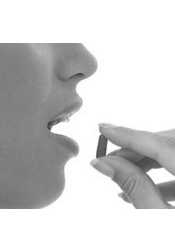Etibi® tablets
This product is manufactured by Bausch Health Canada using the ingredient ethambutol.
This product is taken orally.

play
orally
Why is it prescribed?
Ethambutol is used in combination with at least one other antituberculosis drug to treat tuberculosis.
It is very important to take Etibi® exactly as directed by your doctor. Never stop taking the medication without permission from your doctor.
Try not to miss any doses but if you do, take it as soon as possible. If several hours have passed and it is almost time for your next dose, do not take 2 doses at the same time (unless you have been instructed to do so); resume your normal dosing schedule.
Etibi® tablets can be taken with food to lessen stomach upset.
Notify your doctor if you notice any changes in vision (e.g. blurring, red-green color blindness), or skin rash.
Monthly eye exams are recommended if your dose is greater than 15 mg per kilogram of body weight daily, or if your treatment is longer than 2 months, or if you have kidney disease.
Store this medication at room temperature away from light and moisture.
Alternatives
See other products used in the treatment of •tuberculosis •
Adults: 15–20 mg/kg/day by mouth (up to 1.6 g/day) or Directly Observed Treatment (DOT): 25–40 mg/kg by mouth (up to 2.4 g/dose) 3 times weekly
Children: 15–25 mg/kg/day by mouth (up to 1.6 g/day) or DOT: 30–50 mg/kg (up to 2.4 g/dose) by mouth 3 times weekly
Ethambutol is an antituberculosis drug. It works by seeping into growing tubercle bacilli, and is thought to impair cell metabolism, halt multiplication of the bacteria, and cause cell death.
Along with its needed effects, ethambutol may cause some unwanted or undesirable effects. The frequency and severity of these effects is dependant on many factors including dose, duration of therapy and individual susceptibility. Possible unwanted effects include:
- visual disturbances
- stomach upset
- nausea
Uncommon:
- gout (deposits of uric acid in the joints that cause pain in the joints)
- joint pain
Rare:
- abdominal pain
- vomiting
- headache
- dizziness
- mental confusion
- hallucinations
If you are (or suspect you are) experiencing unwanted effects, report them to your doctor or pharmacist.
Ethambutol use can cause visual problems, but these are generally reversible when the drug is discontinued. Changes in color perception are the first signs of a problem. Notify your doctor if you experience any changes in vision.
During long-term therapy, you may be required to have periodic liver, kidney and blood tests.
Drug Interactions: It is important to tell your doctor and pharmacist of any prescription or over-the-counter medications you are taking. Antacids containing aluminum may alter the absorption of ethambutol. If they must be used, separate their administration by at least 4 hours.
Use is not recommended in the following situations:
- optic neuritis (inflammation of the optic nerve)
- allergy to ethambutol
Caution is recommended in the following situations:
- kidney disease
- cataracts
- diabetic retinopathy (disorder of the retina resulting in impairment or loss of vision)
- other vision problems
Use in pregnancy: Ethambutol can be used in pregnancy but contact your doctor or pharmacist before use.
Use while breastfeeding: Ethambutol passes into breast-milk in small amounts. Contact your doctor or pharmacist before use.
